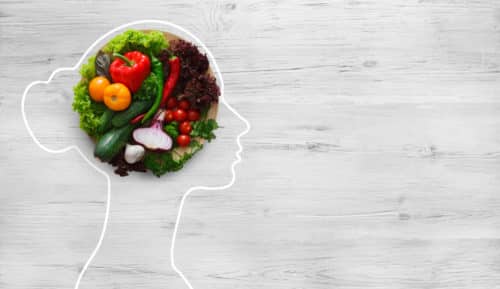 It’s no surprise that nutrition significantly affects mental health, but the extent and nature of the influences specific diets have are less clear-cut. There are innumerable studies of multitudes of diets each one of which identifies specific sets of “good” and “bad” foods. In reality, and in most cases, it comes down to individual tastes and preferences. What is desirable is a balanced nutritional diet, whether that includes animal products or not, gluten or not, and any other food group. This sounds simple enough, but though it is simple, it is not easy; if it were then few people would have any problems. The challenging part about adjusting nutrition to support medical and mental health is building a stronger and more authentic relationship with food.
It’s no surprise that nutrition significantly affects mental health, but the extent and nature of the influences specific diets have are less clear-cut. There are innumerable studies of multitudes of diets each one of which identifies specific sets of “good” and “bad” foods. In reality, and in most cases, it comes down to individual tastes and preferences. What is desirable is a balanced nutritional diet, whether that includes animal products or not, gluten or not, and any other food group. This sounds simple enough, but though it is simple, it is not easy; if it were then few people would have any problems. The challenging part about adjusting nutrition to support medical and mental health is building a stronger and more authentic relationship with food.
Calories and Diets
Healthy diets that are geared towards weight loss can benefit physical health and the way we apply those diets will influence our mental health. When we go on a diet for weight loss, the goal is to eat on a calorie deficit. This is consuming fewer calories than our body is burning on a daily basis. However, many people tend to steer towards an extreme calorie deficit to help them lose weight faster. Not only can this cause medical issues, but it can also create mental health concerns. When we are not receiving enough calories regularly, the body will lack the appropriate nutrients required to function optimally. This can cause problems such as difficulty concentrating, sensitivity to flight/fight/freeze response, and brain fog..
Another important factor is the quality of the food we eat. To support optimal mental health through, it is vital to incorporate a balanced variety of nutrient-dense food regularly. This includes servings of fruits, vegetables, and optimal protein sources. One of the biggest challenges to managing nutrition successfully is the “all or nothing” mentality which can lead to restrictive nutritional patterns which only allow “good” foods, and prohibit “bad” foods.
A balanced mindset about food will help achieve a balanced diet. We can acknowledge there are some foods more nutrient-dense than others. However, I like to add that there are some foods that benefit the body/mind and some foods that are good for the soul. Foods that benefit the body/mind are nutrient-dense, such as fruits, vegetables, and grains. Foods that are good for the soul may include balanced portions of desserts, sweets, and other “friendly” food. A balanced diet can contain all these food types.
Food groups can be divided into 80 percent for nourishing our bodies and mind, and the remaining 20 percent for nourishing our souls and cravings. Completely eschewing entire food groups, can cause intense cravings and impulses to overindulge. The goal is to steer towards a flexible mindset and not allow food to control you, but rather you gain control over how you nourish your body and mind.
 Mind-Gut Connection
Mind-Gut Connection
There is increasing evidence of the connection between our gut health and mental/neurological health. Studies show that about 95% of serotonin is produced in the gastrointestinal tract (Selhub, 2022). Exposing your gut to good bacteria (found in fruits, vegetables, grains, seeds, etc), can strengthen your gut lining, and as a result your immune system.
Essentially, the healthier your gut, the healthier your brain and body. Any time we irritate the gut or struggle with gut health, we risk inflammation in the body and in the brain. This can cause brain fog, difficulty concentrating, and increased proneness to flight/fight/freeze response (commonly seen to trigger anxiety or depressive symptoms).
We can irritate the gut by overconsuming foods that lack nutrients, and eating too quickly or too much in one sitting. A common experience many people experience is the post-Thanksgiving dinner slump– sleepiness, sluggish feeling, and sometimes even brain fog. The major factor in this is not any inherent property of turkey meat, but rather the overeating that traditionally takes place
As was mentioned earlier, the goal is to avoid the “all or nothing” mentality. This includes accepting that sometimes we won’t be able to monitor every aspect of our diet. We need to allow mental and dietary flexibility. Indulging once in a while is not a lack of progress, mentally reproaching yourself afterward is.
Contact us today to schedule a complimentary 15-minute phone consultation or to book an appointment.
References:
Selhub, Eva (2022, September 18). Nutritional psychiatry: Your brain on food. Harvard Health. Retrieved October 15, 2022

